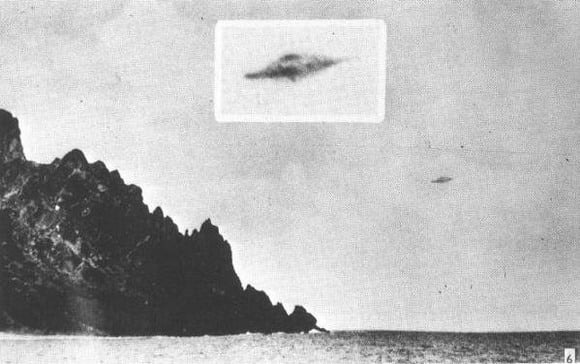Trindade, a small rocky island in the middle of the South Atlantic Ocean 600 miles off the coast of Bahia, Brazil, was the site of one of the most impressive photographic cases in UFO history.
In October 1957 the Brazilian Navy set up a small scientific base on the unoccupied island, where oceanographic and meteorological research would be conducted in connection with the International Geophysical Year. Starting early the next month, instrument-bearing weather balloons were launched daily. They were designed to explode in the upper atmosphere, releasing the instrument packages which would parachute to earth to be retrieved by the researchers. By the end of the month base personnel were reporting silvery UFOs which seemed to be monitoring the balloons’ movements.
On January 1,1958, at 7:50 A.M., the passage of a bright point of light, like a mirror reflecting sunlight, was observed by the entire garrison. The next evening a round object with an orange glow circled the Navy tow ship Triunfo traveling off the Bahian coast 400 miles from Trindade. As the crew watched, the UFO executed sudden right-angle turns and at other times hovered near the ship. The sighting lasted for 10 minutes.
The most fantastic event occurred on the sixth. The base’s chief officer, Cmdr. Carlos A. Bacellar, had just overseen the launching of a weather balloon into a morning sky clear of everything but a single large cumulus cloud at 14,000 feet. Inside the radio cabin Bacellar listened to the signals the balloon emitted as it ascended. Suddenly those signals inexplicably diminished, then went dead.
When Bacellar went outside to investigate, he saw nothing out of the ordinary, at least at first. The balloon was ascending normally—until it came directly below the cloud, at which point it seemed to be sucked abruptly upward. For the next 10 minutes it remained out of sight and inside the cloud. Finally, when it reappeared, it was above the cloud and devoid of the instrument package.
Soon a silvery object emerged from behind the cloud. As it moved slowly from the southwest to the east, a technician gazing through a theodolite spotted it and alerted the commander, who viewed it briefly through binoculars, then through a sextant. Crescent-shaped and bright white in color, the object reversed course at one point and remained in sight for some time before it entered a cloud bank (Fontes, 1960).
